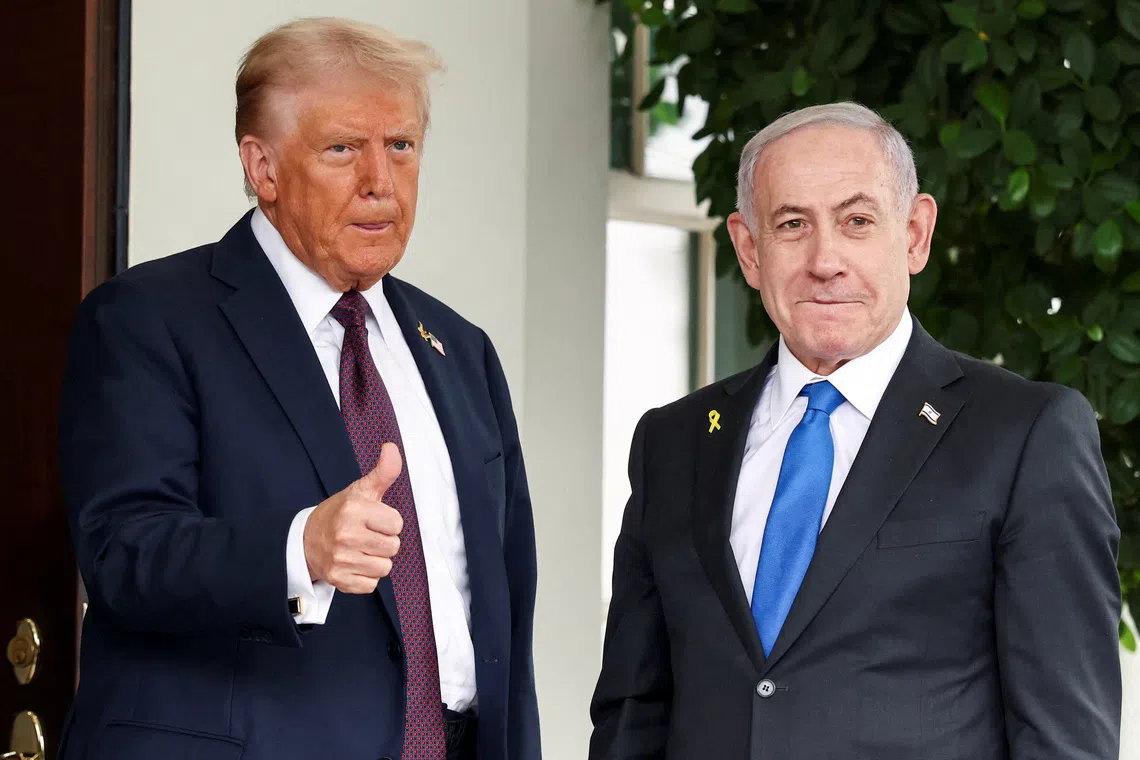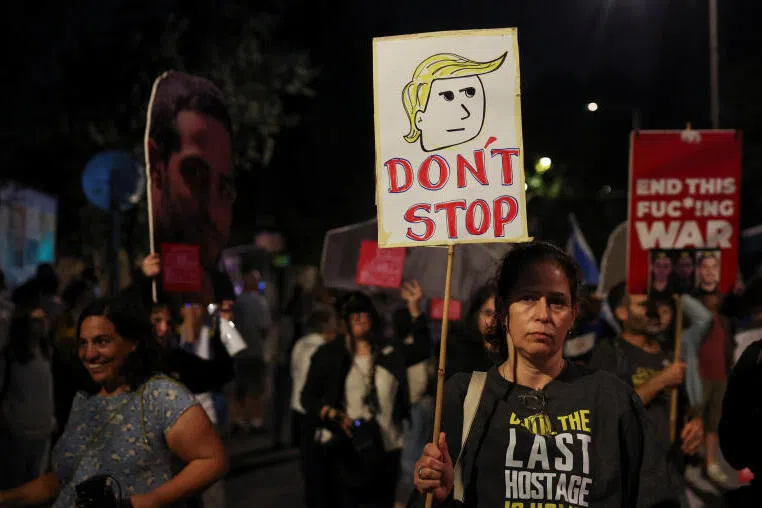Netanyahu faces far-right backlash as Trump presses end to Gaza war
Sign up now: Get ST's newsletters delivered to your inbox

US President Donald Trump giving a thumbs up as he welcomed Israeli Prime Minister Benjamin Netanyahu at the White House in Washington, US, on Sept 29.
PHOTO: REUTERS
Follow topic:
JERUSALEM - A rift within Israeli Prime Minister Benjamin Netanyahu’s far-right coalition is emerging as a flashpoint in efforts to end the war in Gaza, threatening to derail a US push to reshape the political landscape of the Middle East.
Under pressure from US President Donald Trump to end the two-year-old war, Mr Netanyahu is facing a backlash from ultra-nationalist allies whose opposition to the Mr Trump’s Gaza proposal could force the Israeli leader into early elections.
Mr Netanyahu has embraced Mr Trump’s 20-point plan to end the war
Hamas also responded positively, partially accepting Mr Trump’s plan, saying that it was ready to negotiate the hostages’ release
But the idea that Hamas could still exist, let alone be in a position to continue discussing the Gaza plan after hostages are released, has enraged Mr Netanyahu’s right-wing coalition partners.
“We cannot agree under any circumstances to a scenario in which the terrorist organisation that brought the greatest calamity upon the State of Israel is revived,” said National Security Minister Itamar Ben-Gvir.
“We will in no way be partners to that,” he said in a post on social media platform X after the Sabbath, threatening to quit the government.
If far-right ministers believe Mr Netanyahu has made too many concessions to end the war, his ruling coalition – the most right-wing government in Israel’s history – could collapse a full year before the next election, which must be held by October 2026.
But insisting on more war in Gaza would antagonise the families of hostages still held by Palestinian militants in Gaza, and could further alienate a war-weary Israeli public as well as Israel’s international allies.
Continued conflict could also extinguish Israeli hopes that more Arab and Muslim states such as Saudi Arabia or Indonesia could join the Abraham Accords, a set of US-backed agreements that normalised relations between Israel and several Arab states.
Trump calls for halt to Israeli bombardment in Gaza
Expanding the Accords has been a priority for Mr Trump as his administration pursues its own interests in the Middle East, but Riyadh has made it clear that it will not normalise with Israel until the Gaza war ends and there is a path to Palestinian statehood.
Mr Trump has called for Israel to stop bombing Gaza in order for talks on his plan to play out, starting with indirect negotiations between Israel and Hamas in Egypt on Oct 6 for the release of all the remaining hostages.
Mr Netanyahu sees the plan starting with the release of hostages in exchange for Palestinian prisoners.
Of the 48 hostages remaining in Gaza, 20 are believed to be alive.
A second phase would focus on disarming Hamas and demilitarising Gaza.
But on Oct 4, Finance Minister Bezalel Smotrich said that pausing attacks in Gaza was a “grave mistake”.
He said that over time, this would erode Israel’s position as it pursues its aims of freeing the hostages, eliminating Hamas and carrying out the demilitarisation of Gaza.
Mr Ben-Gvir and Mr Smotrich, whose parties hold 13 of the Knesset’s 120 seats, have long pushed Mr Netanyahu to pursue sweeping, seemingly unattainable goals in Gaza.
If both were to leave the government, it would likely trigger an election.
No Gaza ceasefire yet, says Israeli government
Israeli government spokeswoman Shosh Bedrosian told reporters on Oct 5 that the military had stopped what she said was certain bombings but that there was no ceasefire in place.

Families and supporters of hostages kidnapped by Hamas rallying outside Israeli Prime Minister Benjamin Netanyahu’s residence as they called for a swift implementation of the agreement to end the war and return all hostages, in Jerusalem on Oct 5.
PHOTO: REUTERS
The military would continue to act for “defensive purposes”, she said. Despite Mr Trump’s call to halt the bombing, Israeli strikes on Gaza at the weekend
Mr Netanyahu has framed the plan as a joint effort that advances the government’s goals, which include Hamas’ surrender and Israeli security control in Gaza and its perimeter.
But Mr Trump’s plan lacks details, including any sort of timeframe for Hamas to disarm. A vague reference to Palestinian statehood is also likely to infuriate Mr Netanyahu's far-right allies.
Israeli pollster Mitchell Barak, who worked for Mr Netanyahu in the 1990s, said he believed that the government was nearing its end, though he did not expect an immediate collapse, given that the opposition supports the Trump plan while Mr Smotrich and Mr Ben-Gvir have few options other than staying aligned with Mr Netanyahu.
Opposition leader Yair Lapid has offered to lend the government support to prevent it from collapsing in order to see through Mr Trump’s plan.
Mr Lapid on Oct 5 said Mr Netanyahu could agree to an election date, offering “insurance” from what he called the Prime Minister's “extremist and irresponsible partners”. REUTERS

